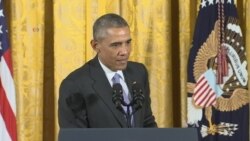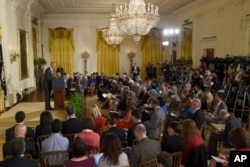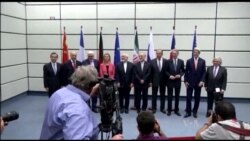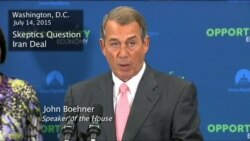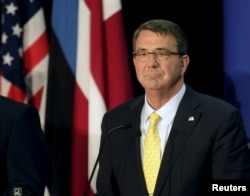President Barack Obama staunchly defended the historic deal that aims to restrain Tehran's nuclear development program Wednesday, saying it represents the world's best "means of ensuring Iran does not get a nuclear weapon."
Seeking to sell the Iran nuclear deal to skeptical U.S. lawmakers and the American public, Obama insisted the landmark agreement is also the best way to avoid a nuclear arms race and more war in the Middle East.
At the nationally televised White House news conference, the president repeated his conviction that the pact "cuts off every single path" for Iran to build a nuclear bomb, making the United States, its allies and the world "safer and more secure."
Review process
He said if the U.S., through the congressional review process, misses the chance to approve the deal, "history will judge us harshly," and that another opportunity to complete a deal with Iran "may not come in our lifetime."
Obama also called U.S.-led negotiations with Iran "a powerful display of American leadership," emphasizing the increased transparency the agreement entails on part of International Atomic Energy Agency (IAEA) inspectors, who would carry out the "largest inspection regime in history."
"Without a deal, the international sanctions regime will unravel, with little ability to re-impose it," he said. "With this deal, we have the possibility to peacefully resolve a major threat to regional and international security."
Without a deal, Obama said there would have been a risk of more fighting in the Middle East, and that other countries in the region would feel compelled to pursue their own nuclear programs "in the most volatile region in the world."
While the U.S. cannot control regional conflicts in the Middle East, he said the United States can work with its Mideast allies to provide support for educational programs that help improve the plight of impoverished, poorly educated youths, so that they will be less open to Islamic State appeals to them to join insurgents in their fight against the West.
Rebutting complaints
Obama answered some questions about U.S. domestic issues, but at one point pleaded for more Iran questions from reporters, in hopes of rebutting other complaints about the deal, to "make sure no stone is left unturned."
"If you listen to some of the critics of this deal, you'd think Iran was going to take over the world," he said, insisting that is not the case.
Obama said that even if Iran eventually decides to build a nuclear weapon after 10 or 15 years of international monitoring, the U.S. "would still be in position" to mobilize other countries against Tehran's efforts.
"It is incumbent" on critics, he said, to say how a future U.S. president would be in a worse position with regard to Iranian nuclear intentions if the deal is not implemented.
Watch: Related video by Carolyn Presutti
Staunch opposition
After Iran and six world powers sealed an accord in Vienna on Tuesday, White House officials reiterated their long-held belief that robust debate over the deal would – and should – follow in Congress, where it faces wide opposition from Republican lawmakers and Republican presidential contenders seeking to replace Obama when his second term concludes in 2017.
He called the contention by some opponents that Iran should have no nuclear capability, not even for peaceful purposes, unrealistic.
The president also said he does not anticipate that Republicans in Congress will rally around the nuclear pact, but said that if lawmakers vote based on the facts the majority of them should approve the deal.
"The world does not agree that Iran can't have a peaceful nuclear program," he said, adding that the United States and other countries have joined in forcing constraints on any development of an Iranian nuclear weapon.
There "will be real consequences" for Iran if it violates terms of the deal, he said, including reintroduction of economic sanctions that will end if Tehran adheres to the deal it agreed to after months of negotiations with Britain, France, Germany, China, Russia and the U.S.
Eradicating the prospect of nuclear weapons in Iran is something Obama has repeatedly described as an objective shared by international and domestic entities alike, including Democratic and Republican members of Congress.
The agreement, which represents the biggest step toward rapprochement between Iran and the West since the 1979 Islamic Revolution, is also perceived as a political triumph for Obama, who has made outreach to America's enemies a hallmark of his presidency.
It is also seen as his biggest foreign policy gamble since taking office in 2009.
Americans held in Iran
Obama said the United States is continuing to pressure Iran to release three Americans being held by Tehran, including Washington Post correspondent Jason Rezaian, former Marine Amir Hekmati, Christian pastor Saeed Abedini and ex-FBI Agent Robert Levinson, whose whereabouts in Iran remains unknown.
Some critics of the Iran deal said the president should not have agreed to it without the return of the four to the United States.
Obama said the U.S. did not include the status of the jailed Americans in the nuclear talks because it would have made it more difficult to walk away from a deal the U.S. did not like. He also said he didn't want to encourage Iran to use the prisoners as leverage in the talks.
Securing support
Kicking off what is expected to be a lengthy campaign to lock in political support for the historic deal, Vice President Joseph Biden arrived at Congress shortly after 9 a.m. Wednesday for a closed-door meeting to brief minority Democrats in the House of Representatives.
One lawmaker quoted Biden as saying that "nothing in this agreement takes the military option off the table" for an attack against Iran if it violates the deal and starts building a nuclear weapon.
Another said the vice president contended that "the entire sanctions regime" that has been imposed against Iran to pressure it to complete a deal "would crumble" if the pact negotiated by the United States and five other world powers is not implemented.
Once Congress is handed the formal agreement, it has 60 days to consider whether to reject it, and even it does, Obama has promised to veto such legislation. If that were to happen, both houses of Congress would then have to produce a two-thirds majority to override the president's veto.
One vocal Republican opponent of the deal, Senator John McCain, who lost the 2008 presidential election to Obama, acknowledged to VOA that it "is likely" that the deal will eventually be approved.
WATCH: Republicans Blast Iran Nuclear Deal
Opponents of the agreement continued their barrage of attacks Wednesday. One leading Republican presidential contender, real estate mogul Donald Trump, called it a "disgrace," while another candidate, Senator Lindsey Graham, said it was "a terrible idea."
Key Points of Iran Nuclear Accord
Key Points of the Iran Nuclear Deal
- Iran will reduce stockpile of low-enriched uranium by 98 percent to 300 kg for 15 years
- Iran will reduce by two-thirds the number of centrifuges operating to enrich uranium at its main processing center
- Iran is prevented from designing warheads or conducting experiments on nuclear weapons-related technology.
- Arms embargo on Iran will be eased, as long as IAEA judges Iran's nuclear program to be peaceful.
- International sanctions on Iran will be lifted, enabling it to export oil.
- If an international panel finds Iran is not honoring the accord, it can vote to restore sanctions.
In an interview with the New York Times, Obama said the agreement achieves the basic goal that even critics agree with: that Iran should not have the capacity to develop a nuclear weapon.
"This is our best option to make sure that not just for the first 10 years, but for years afterwards, we have a verifiable inspection regime that ensures they do not obtain a nuclear weapon," Obama said. "That is worth an enormous amount in terms of our national security, and Israel's national security and our other allies' national security in the region. It also prevents the possibility of a nuclear arms race in the region."
He said whoever is president 10 or 15 years from now will have the same ability to use military action or to impose new sanctions, but with the agreement they will also have more insight into Iran's nuclear program and "international legitimacy" to act against any violations.
Israel, Gulf allies
Obama also mentioned the need to work with Israel and Gulf allies to guard against the possibility of Iran using money unlocked by sanctions to sponsor terrorism.
On Tuesday, the president discussed the Iran deal with various allies in the Middle East, including Saudi Arabia's King Salman and Crown Prince Mohammed Al Nahyan of the United Arab Emirates.
The White House said Obama recalled a summit earlier this year with Persian Gulf nations, and reiterated that the U.S. remains committed to working with them to counter Iran's destabilizing activities in the region.
The prospect of an increasingly assertive Iran has seen Gulf States build up their militaries, largely with U.S. weaponry.
Next week, U.S. Defense Secretary Ash Carter will head to the Middle East to try to reassure allies that the Iran deal will not undermine America's commitment to their security.
As of late Tuesday, the White House had disclosed only one stop: Israel, where Prime Minister Benjamin Netanyahu has already condemned the accord as "a stunning, historic mistake."
"We will reserve our right to defend ourselves against all of our enemies," Netanyahu told Israeli parliament Wednesday, saying the Jewish state isn't bound by the Iranian nuclear deal and will continue to oppose it. "We have strength, and it is great and mighty."
Via Twitter, Iranian Foreign Minister Mohammad Javad Zarif spoke of the deal as a new diplomatic beginning for the countries involved, calling it “not a ceiling but a solid foundation. We must now begin to build on it.”
Meanwhile, French Foreign Minister Laurent Fabius said Wednesday that he will visit Iran, after being invited by Zarif at the close of the negotiations. Fabius did not say when the trip would take place.
Some material for this report is from Reuters.




